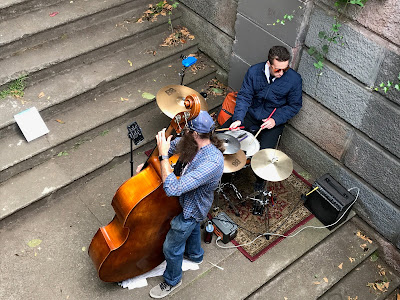The drug-addled engineer, space cadet, and failing auto magnate is apparently on a PR tour trying to exonerate himself for the crimes he's done for the Trump regime. And the legacy media seem inclined to let him off the hook with puff pieces that treat his DOGE rampage as well-meaning.
I'm not that forgiving. The guy is a sociopath with money, not actually an uncommon type in this this country. Think anti-union industrialist Henry Clay Frick or anti-semitic car maker Henry Ford.
Michelle Goldberg of the New York Times (gift link) makes an overwhelming moral case against the guy:Elon Musk’s Legacy Is Disease, Starvation and Death ... Musk, with the help of his minions, achieved his goals. He did indeed shred the United States Agency for International Development. Though a rump operation is operating inside the State Department, the administration says that it has terminated more than 80 percent of U.S.A.I.D. grants. Brooke Nichols, an associate professor of global health at Boston University, has estimated that these cuts have already resulted in about 300,000 deaths, most of them of children, and will most likely lead to significantly more by the end of the year. That is what Musk’s foray into politics accomplished.
... Musk apparently did not anticipate that it would be bad P.R. for the world’s richest man to take food and medicine from the world’s poorest children. The Post reported that he hadn’t foreseen “the intensity of the blowback to his role in politics over the past year.”
...If there were justice in the world, Musk would never be able to repair his reputation, at least not without devoting the bulk of his fortune to easing the misery he’s engendered. Musk’s sojourn in government has revealed severe flaws in his character — a blithe, dehumanizing cruelty and a deadly incuriosity. This should shape how he’s seen for the rest of his public life.
Public policy professor Donald Moynihan evaluates Musk's rampage from the perspective of a student of government:
Presidents shouldn't put people with drug problems in charge of our government ... Musk has real achievements in running large organizations. Thats the case for Musk being given a big role in government. The case against handing Musk control of government was also pretty strong however. The Twitter model of downsizing that Musk promised to bring to government was always doomed to fail, reflecting ignorance of how federal spending actually works.
If we are just learning the extent of Musk’s drug use, his addiction to social media and the damage that it has done has been plain for years. ...
... Musk’s drug and social media consumption disconnect him from reality, feeding what appears to be an underlying tendency towards paranoia and conspiracy theories. The interaction effect between the two appear to be deeply unhealthy for him. But they are also deeply bad for everyone else since he is making literal life-or-death decisions.
For example, the most persuasive reason why Musk decided to eliminate USAID appears to be that he believed social media conspiracy theories that it was full of criminals. And so now USAID no longer exists, and credible estimates suggest that 300,000 people have died as a result, two-thirds of them children.
This man had no business in government; we suffer from having elected a chief executive who may be even less a responsible actor than Musk himself. And now Trump finds Musk a liability in opinion polls.
Musk is not a rational actor, and rationality is a pretty basic value for managing public services. I don’t know how much of this is the drugs, the media bubble he has created, or underlying personality issues, but it is clear a) it has gotten worse, and b) he has no business making decisions that affect the lives of others....
Musk has been enabled. ... Musk is a source of money and power for his friends, and a threat to his enemies. He was Trump’s biggest funder, and turned X into a Republican propaganda machine. ...
Media sycophancy doesn't help:
... I am glad he is out of government, to be sure. But spare me the fawning profiles of his business genius at this moment. Some of the coverage notes that DOGE was less than successful, and did not achieve its goals, but rarely focuses on the harm caused.
If you are unable to bring accountability to the richest man in the world fucking up our government, then you are a PR flack, not a journalist.
Now the whole Elon withdrawal from the White House thing may just be a feint, covering the ongoing theft of our data by his incel groupies spread out inside the government. But there's no question Elon is feeling a sad over being branded the smartest moron around. (Except perhaps Trump?)
Meanwhile, the good people of the Teslatakedown are doing our best to give Elon Musk a tiny bit of his deserts. Make that car company toxic! If there were justice, he'd have a lot of reparations to make.

























